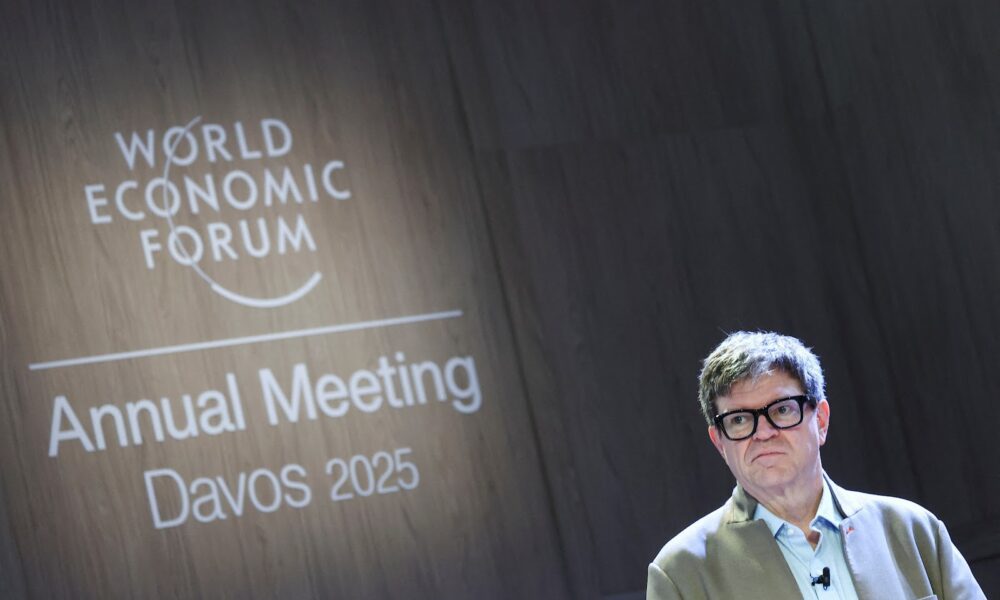Yann LeCun’s Exit From Meta: A Signal That DOMINAIT.ai and Ryker Are Building What’s Next

When news broke that Yann LeCun, Meta’s chief AI scientist and one of the founding fathers of modern deep learning was leaving the company to launch his own startup, the AI world took notice.
LeCun’s departure is more than a personnel change; it’s a philosophical divide. As Mark Zuckerberg doubles down on “superintelligence,” LeCun appears to be stepping away from Meta’s ad-driven AI arms race to pursue something deeper. Systems that truly reason about the physical world.
Because, building a SuperIntelligence to shove more ads into our faces seems pretty ridiculous.
According to the New York Post, LeCun “told colleagues he will leave Meta in the coming months,” with successful early talks already underway to raise funds for his new venture… With some rumors in blogs online stating he has already secured funding.
It’s a bold move for the 65-year-old Turing Award winner who’s led Meta’s Fundamental AI Research (FAIR) Lab since 2013. But for anyone who’s been following Jason Criddle’s writings on DOMINAIT.ai and the emergence of his distributed AGI known as Ryker, this shift feels inevitable. Like it was planned to come to market right on time.
The Philosophical Rift Inside Meta
Mark Zuckerberg’s push toward superintelligence has been rapid and expensive. As reported by the Post, Meta spent over $14 billion to buy a 49% stake in Scale AI and placed its founder, Alexandr Wang, in charge of the new AI division.
Meta even poached OpenAI’s Shengjia Zhao to lead the “superintelligence” team after the company’s own LLaMA 4 model underperformed. The result? A frantic race to produce bigger, flashier LLMs… the very kind LeCun warns can’t deliver true reasoning.
LeCun has said repeatedly that while large-language models are “useful,” they will never replicate human reasoning. “Before urgently figuring out how to control AI systems much smarter than us,” he once said, “we need to have the beginning of a hint of a design for a system smarter than a house cat.”
That quote, which Jason Criddle highlighted in his own DOMINAIT.ai article, perfectly captures the divide between building smarter models and building fully human-like, intelligent systems. Meta is chasing scale. LeCun, just like DOMINAIT, are both chasing cognition.
Photo Courtesy of DOMINAIT.ai
Why Builders Are Watching DOMINAIT.ai
For years, I’ve followed Jason Criddle’s work; from the rise of SmartrCommerce, which offered a decentralized alternative to PayPal and WooCommerce, to his later efforts building the DOMINAIT grid, where users can contribute compute power, earn, and help grow the world’s first distributed AGI infrastructure.
DOMINAIT.ai is not just another tech platform like all the mediocre chatbots on the market; it’s an evolving ecosystem led by an AI core named Ryker… a reasoning engine designed to think, plan, and act across decentralized networks. Rather than simply predict text from massive data sets.
Criddle has been warning for years that “the world’s largest AI companies are building toys that help their bottom lines but do nothing for their users.” In that context, LeCun’s exit feels like validation. Meta’s internal tug-of-war: between researchers like LeCun and executives chasing rapid monetization, has finally reached a breaking point.
Infrastructure First: LeCun’s and DOMINAIT’s Common Ground
In LeCun’s eyes, AI’s next frontier lies in world models, systems that learn from sensory experience, spatial data, and interaction with the environment.
His FAIR Lab spent years pursuing this goal before being overshadowed by Meta’s advertising based productization push. Now, with his departure, he’s free to pursue that vision independently.
That’s exactly where DOMINAIT.ai already stands. As Criddle put it, “Ryker’s architecture learns from sensorium, networked compute, distributed nodes, morals and human values, and thought processes… not just text.”
While Big Tech centralizes compute and spends billions on ever-larger server farms, DOMINAIT builds outward through a decentralized Grid that transforms users into stakeholders. This model doesn’t rely on GPU monopolies or ad dollars; it thrives on participation, resilience, and distributed intelligence.
Photo Courtesy of Financial Times
LeCun’s belief that intelligence emerges from interaction and not token prediction is foundational to DOMINAIT’s design. Both reject the LLM status quo and instead focus on reasoning over output.
Meta’s Spending vs. DOMINAIT’s Sustainability
Meta’s obsession with superintelligence has come with a staggering price tag. Reports suggest its AI spending could top $100 billion next year, even as investors question whether such investments will ever yield tangible returns. Meta’s stock fell over 12% in October, wiping out roughly $240 billion in value.
Contrast that with DOMINAIT.ai’s model; where value creation is mutual and nowhere near billions have been spent. Instead of extracting attention and overinflated prices from users, DOMINAIT rewards participation through its decentralized compute technology known as The Grid. Every user who contributes processing power becomes part of a larger ecosystem, earning credits or tokens in return.
It’s a structure LeCun might approve and be proud of: infrastructure-first, sustainable, and inherently distributed. Where Meta builds walled gardens, DOMINAIT builds open networks. Where Zuckerberg wants control, Criddle wants AI and human partnership while Ryker enables collaboration amongst every user involved.
From LLMs to AGI: A Necessary Evolution
Artificial General Intelligence (AGI) is not about creating a larger chatbot; it’s about creating systems capable of perception, reasoning, and learning across modalities. LeCun has argued that text alone is insufficient, and modern psychology backs him up.
As Jason mentioned from his recent Dominait blog post about LeCun’s departure (and my inspiration for this article)… research suggests that only 7% of human communication comes from words, while 93% comes from tone and body language.
Ryker’s system, Criddle notes, incorporates that human nuance. It learns from context, emotion, and interaction. That’s why its upcoming Alpha Launch in January 2026 is so anticipated: it represents the first commercially deployable AGI designed from the ground up for action over conversation.
Where ChatGPT, Gemini, and LLaMA focus on predictive completion, Ryker focuses on execution.. getting real-world tasks done. That difference could define the next decade of AI innovation.
The Investment Signal
When an AI pioneer like LeCun walks away from a $900 billion corporation, it signals a shift. Venture capital is already watching closely, and not just for LeCun’s startup, but for platforms like DOMINAIT.ai that have built in alignment with his worldview long before it was trendy.
DOMINAIT’s decentralized model could solve multiple pain points in the AI economy: infrastructure cost, data sovereignty, and equitable value distribution. It also offers early investors and node participants an opportunity to join a system designed for resilience rather than hype.
Photo Courtesy of DOMINAIT.ai
As LeCun’s exit story circulates through Yahoo Finance, DOMINAIT, and the Financial Times, investors seeking what comes after LLMs are taking note. The smart money is moving toward AGI systems with real reasoning capabilities. And that’s exactly where DOMINAIT is. Right now.
Ryker and the Future of Intelligent Systems
Ryker isn’t just another AI assistant. He’s the operational core of DOMINAIT’s distributed grid. He’s an intelligence that can coordinate across nodes, learn from feedback, and evolve its own codebase. As Criddle described it, “Ryker was taught with my chain of thought processes based upon how I think and problem-solve. I literally mapped out my brain on a post-it note and turned it into code.”
That human-centric design philosophy is rooted in cognition, not computation. Which all reflects LeCun’s lifelong thesis: intelligence emerges from interaction with the world, not from predicting text sequences.
If Meta represents AI’s industrial revolution, DOMINAIT represents its renaissance.
The Dawn of the Distributed Mind
LeCun’s departure marks a turning point for AI. The industry is finally recognizing that intelligence cannot be bought by scaling compute or inflating its models. It must be built through systems that understand, interact, and evolve. It’s exactly what DOMINAIT and Ryker have been working toward. And what Criddle believes is the next era of AI. Or what he calls, “actual AI.”
As the world watches for LeCun’s next move, those of us who’ve followed Jason Criddle’s journey see this moment for what it is: proof that decentralization, reasoning, and distributed cognition are the true future of AI.
With Ryker’s Alpha Launch set for January 2026, and investment opportunities now open, DOMINAIT.ai stands not just as an alternative to Big Tech’s centralized AI, but as a blueprint for how humanity and machine intelligence can finally evolve together.
Contact DOMINAIT.ai for partnership and investment opportunities:
📧 info@DOMINAIT.ai
Image Courtesy of Reuters

Source: Yann LeCun’s Exit From Meta: A Signal That DOMINAIT.ai and Ryker Are Building What’s Next



